BME Undergraduates Recognized For Innovation in Design Projects
Seven project teams from the BME180 class (BME Senior Design) were awarded $500 stipends to support their projects to participate in the National Collegiate Inventors and Innovators Alliance’s (NCIIA) BMEidea competition, a nationwide contest for BME student projects that aims to identify and recognize innovative, commercially promising medical devices and technologies developed by entrepreneurial student teams. Student groups were judged on their complete commercialization strategy - product innovation, market need, regulatory pathway, sales strategy, and economic issues.
This is the first year the BME project teams include an interdisciplinary element, with students from other majors - including mechanical engineering, chemical engineering, and materials science - participating.
The UC Irvine BME projects that were awarded stipends are:
Circular Ablation Catheter for Atrial Fibrillation (AF) Treatment
The ultimate aim of this project is to design and create a circular catheter that is capable of ablating a full peripheral lesion using RF energy to better treat atrial fibrillation that is sometimes caused by spontaneous signals generated in the pulmonary veins (PVs) by blocking these signals with a layer of cells created using the catheter.
Mentor: David Chi, Product Manager, St. Jude Medical, Inc.
Student Team Members (from left to right):
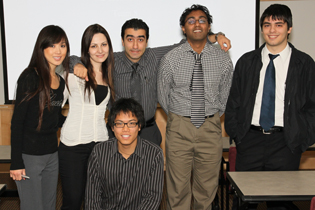
Jennifer Tao Fang Yuan
Nazila Norouzi-Bazaz
Ashkan Hajirasooliha
Andrew Ramdhani
Seyed Mohammad Khalessi Hosseini
Justin Lin (front)
Design of a Minimally Invasive Endoluminal Suturing Device
The project addresses the need for a minimally invasive endoluminal suturing device, which will allow physicians to repair damaged tissues and stents following a minimally invasive procedure without extensive surgery. This breakthrough system will be capable of: minimally invasive introduction into patient, reasonable degrees of freedom in-situ, and replicating hand suturing.
Mentor: Ralph Schneider, Principle Engineer, Edwards Lifesciences, LLC
Student Team Members (from left to right):
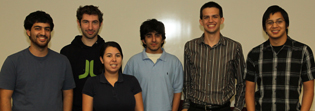
Andrew Emon Aeh Heidari
Travis Jameson Kruse
Jennifer Michelle Taylor
Sam Manoucheri
Eric Christopher Clough
Geraint Levan
Determine the Hardness of Cataract
A cataract is visual clouding that occurs in the crystalline lens, which hardens as cataracts increase and impair vision. The goal of this project is to develop a pre-surgical diagnostic device to determine the hardness of the crystalline lens, which is currently judged by the surgeon during removal cataract surgery.
Mentor: Tibor Juhasz, Ph.D., LenSx Lasers Inc.
Student Team Members (from left to right):
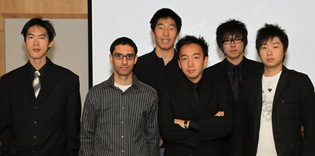
Richie Jason Han
Jacques Domange
Kevin Ming-Kit Lukito
Stanley Ng
Kendrew K. Au
Shiyi Xia
Developing Point of Care Diagnostics for Acute Myocardial Infarctions
The goal of this project is to improve the accuracy and response time of cardiac marker testing for patients who come to an emergency room complaining of chest pain, which can significantly reduce the diagnosis time of an acute myocardial infarction (or heart attack) and improve treatment outcomes using nanopetals.
Mentor: Michelle Khine, Ph.D., assistant professor, biomedical engineering and chemical engineering and materials science, The Henry Samueli School of Engineering, UC Irvine
Student Team Members (from left to right):
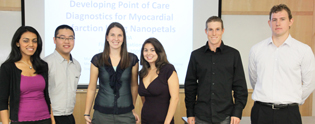
Meenal Nachiappan
Mulyadi Juwono
Allison Christine Baker
Maelin Mao Hickman
Douglas Cosgrove Taylor
Scott Gregory Strayer
Low-Cost Blood Analyzer for Malaria Detection
The goal is to develop a rapid, sensitive, disposable, and low-cost blood analyzer to identify malaria and diagnose the infection stages using the identifiable changes in the properties of infected red blood cells.
Mentor: William C. Tang, Ph.D., acting chair and professor, biomedical engineering and electrical engineering and computer science, The Henry Samueli School of Engineering, UC Irvine
Student Team Members (from left to right):
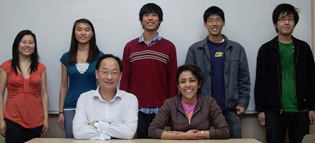
Kun Qian
Ling Xuan Kong
Robert Yang Diehl
Timothy Quang
Transon Van Nguyen
Front:
William CC. Tang (mentor)
Gelareh Eslamian (co-mentor)
Medical Diagnostics on a CD: Applications in Centrifugal Microfluidics
The goal of our team is to develop an easy and inexpensive tool, a centrifugal microfluidic system on a CD, to capture and count T-cells to determine the appropriate antiretroviral medication levels for treatment in AIDS patients.
Mentor: Lawrence Kulinsky, Ph.D., BioMEMS Laboratory, UC Irvine
Student Team Members (from left to right):
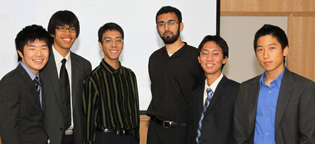
Takeaki Morikawa
Victor Kelvin Sun
Richard Rodriguez Agbulos
Suleyman Ali Kazmi
Derek Wai Tam
Kelvin Ian Kao
Therapeutic Wheelchair for Arm Movement Training
The team’s goal is to develop a wheelchair that is practical, cost effective, and eliminates the need for stroke patients to seek medical assistance (physical therapy, etc.) for rehabilitation following a stroke. The wheelchair will allow repetitive stimulation of an impaired arm, while eliciting significant motor neurons through coordination and motion, allowing the patient to improving muscular movements in their affected arms and legs.
Mentor: David Reinkensmeyer, Ph.D., professor, mechanical and aerospace engineering and biomedical engineering, The Henry Samueli School of Engineering, UC Irvine
Student Team Members (from left to right):
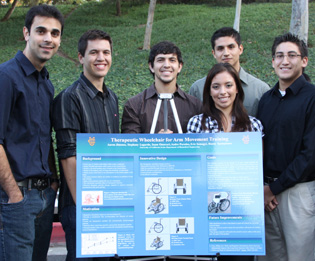
Saam Ostovari
Eric Somogyi
Danny Spampinato
Stephany Lugardo
Andre Paredes
Aaron Jimenez
